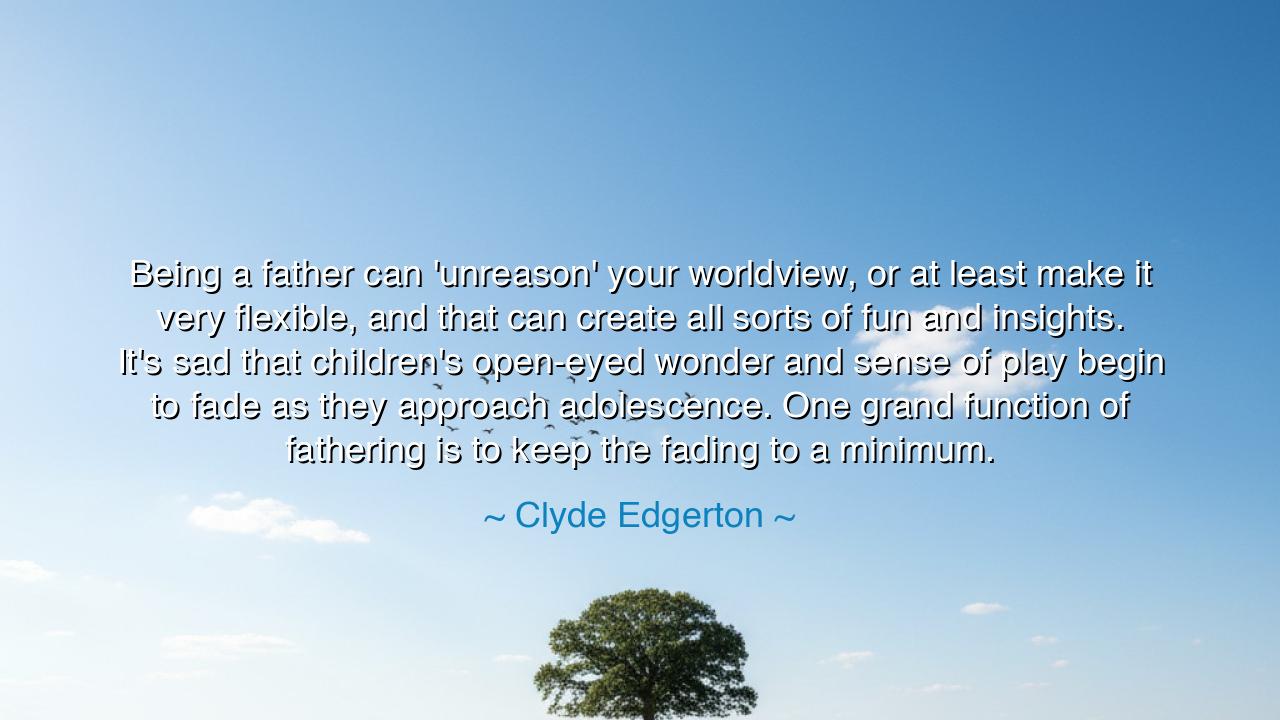
Being a father can 'unreason' your worldview, or at least make it
Being a father can 'unreason' your worldview, or at least make it very flexible, and that can create all sorts of fun and insights. It's sad that children's open-eyed wonder and sense of play begin to fade as they approach adolescence. One grand function of fathering is to keep the fading to a minimum.






Clyde Edgerton, with the heart of a father and the wisdom of a storyteller, once declared: “Being a father can ‘unreason’ your worldview, or at least make it very flexible, and that can create all sorts of fun and insights. It’s sad that children’s open-eyed wonder and sense of play begin to fade as they approach adolescence. One grand function of fathering is to keep the fading to a minimum.” These words speak to the transforming power of parenthood, to the tender duty of preserving childhood wonder, and to the humility of a man who has learned from his children as much as he has taught them.
At the heart of his reflection lies the phrase “unreason your worldview.” To be a father is to be dislodged from the rigid habits of adulthood. Children, with their laughter, their questions, and their boundless curiosity, break open the walls of certainty and force the grown man to see the world anew. What once seemed logical, fixed, and grave, becomes fluid and flexible when refracted through a child’s eyes. In this way, fatherhood becomes not only a responsibility but also a renewal.
And yet, Edgerton names a sorrow: the sadness of fading wonder. For children, the world is a garden of marvels—every stone a mystery, every shadow a story. But as adolescence arrives, the burdens of conformity, fear, and cynicism descend. The open-eyed wonder grows dim, the sense of play is cast aside as “childish.” This fading is not natural; it is the weight of a world that demands seriousness too soon. The father, therefore, becomes a guardian of joy, a keeper of imagination, tasked with slowing this decline.
History offers many mirrors. Recall Socrates, who was said to walk through the markets of Athens with the curiosity of a child, marveling at each new thing, asking questions not to trap but to wonder. His greatness lay in never letting the flame of inquiry die. In a similar way, the Renaissance masters—da Vinci above all—retained their childlike fascination with how birds flew, how rivers curved, how bodies moved. They did not let their sense of play fade, and thus they changed the world. Fathers, mothers, and mentors have the same role: to protect that sacred fire in the young.
Edgerton’s words also remind us that fun and insights are not opposed to wisdom. In fact, they are its companions. A parent who kneels on the floor to play, who answers a child’s endless questions with patience, learns more of life than one who clings to solemnity. For in such moments, truth is revealed: that joy is not trivial, that play is not wasteful, and that seriousness without laughter is but half a life.
The lesson is clear: those who guide children must themselves be willing to change. To father or mother well is not to impose a rigid order upon youth, but to preserve their wonder while teaching them strength. The task is not only to protect from harm, but to protect from despair, from cynicism, from the death of joy. To do this requires humility, patience, and above all, a willingness to be “unreasoned,” to let go of one’s hardened worldview and join in the play.
Practically, this means carving out time to listen to children’s questions without rushing, to play their games without embarrassment, to encourage creativity without judgment. It means valuing the small marvels—bugs in the grass, shapes in the clouds, music made from pots and pans—as seriously as school lessons. And it means modeling curiosity, showing children that wonder is not something to outgrow, but something to carry into every stage of life.
Thus, Clyde Edgerton’s words stand as both reminder and charge: fatherhood is not merely about providing, but about preserving. The world may press hard to strip away a child’s delight, but the father, through his love and his willingness to be changed, can keep the flame alive. And in doing so, he discovers that wonder is not only a gift to the child—it is the salvation of the adult.






AAdministratorAdministrator
Welcome, honored guests. Please leave a comment, we will respond soon